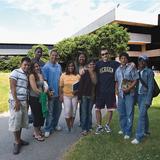- SUNY Rockland is the only public higher education institution in Rockland County. It has served as an educational resource for Rockland since 1959, offering small classes, personal attention and caring faculty. In addition to the main campus in Suffern, the College operates extension sites in Spring Valley and Haverstraw. Close to 10,000 people are enrolled in credit and non-credit courses, and over 200,000 visit the campus each year for cultural, recreational and commercial events.
School Highlights
Rockland Community College serves 7,790 students (37% of students are full-time).
The college's student-teacher ratio of 14:1 is higher than the state community college average of 13:1.
Minority enrollment is 72% of the student body (majority Hispanic), which is more than the state average of 62%.
Quick Facts (2026)
- Enrollment: 7,790 students
- In-state tuition: $4,654
- Out-state tuition: $8,953
- Acceptance Rate: 60%
- Student-teacher ratio: 14:1
- Minority enrollment: 72%
- Source: Integrated Postsecondary Education Data System (IPEDS)
Top Rankings
Rockland Community College ranks among the top 20% of public schools in New York for:
Category
Attribute
Diversity
Community Size
Debt For Students
School Overview
The teacher population of 547 teachers has stayed relatively flat over five years.
Rockland Community College
(NY) Community College Avg.
Carnegie Classification
Associate's Colleges: High Transfer-High Traditional
Baccalaureate/Associate's Colleges: Mixed Baccalaureate/Associate's
Institution Level
At least 2 but less than 4 years
At least 2 but less than 4 years
Institution Control
Public
Private not-for-profit
Total Faculty
547 staff
159 staff
School Calendar
Student Body
The student population of Rockland Community College has grown by 35% over five years.
The student-teacher ratio of 14:1 has decreased from 31:1 over five years.
The Rockland Community College diversity score of 0.76 is equal to the state average of 0.76. The school's diversity has stayed relatively flat over five years.
Total Enrollment
7,790 students
1,129 students
Student-Teacher Ratio
14:1
13:1
# Full-Time Students
2,905 students
528 students
# Part-Time Students
4,885 students
601 students
# Enrollment Undergraduate
779 students
357 students
# Full-Time Undergraduate Students
2,905 students
519 students
# Full-Time Graduate Students
n/a
44 students
# Part-Time Undergraduate Students
4,885 students
850 students
# Part-Time Graduate Students
n/a
41 students
Total Dormitory Capacity
n/a
382 students
% American Indian/Alaskan
n/a
n/a
% Asian
5%
8%
% Hispanic
33%
23%
% Black
18%
18%
% White
28%
38%
% Hawaiian
n/a
2%
% Two or more races
3%
3%
% Non Resident races
2%
3%
% Unknown races
11%
5%
Diversity Score
0.76
0.76
College Completion Rate (Students who graduate in less than 4 years)
30%
33%
College Completion Rate (Students who graduate in 4 years or more than 4 years)
n/a
40%
Average Graduate Earnings (10 Years)
$40,400
$35,200
Tuition and Acceptance Rate
The public in-state tuition of $4,654 is less than the state average of $5,902. The in-state tuition has declined by 17% over four years.
The public out-state tuition of $8,953 is less than the state average of $10,404. The out-state tuition has declined by 16% over four years.
In-State Tuition Fees
$4,654
$5,902
Out-State Tuition Fees
$8,953
$10,404
% Students Receiving Some Financial Aid
56%
88%
Median Debt for Graduates
$8,500
$13,841
Median Debt for Dropouts
$5,500
$5,500
Acceptance Rate
60%
74%
SAT Reading
n/a
475
SAT Math
n/a
505
SAT Writing
n/a
485
ACT Composite
n/a
20
ACT English
n/a
18
ACT Math
n/a
20
Source: 2024 (or latest year available) Integrated Postsecondary Education Data System (IPEDS)
School Notes
- Located in the historic and scenic Hudson Valley only 25 miles northwest of New York City, picturesque Rockland offers the best of all worlds, including recreational and cultural attractions and easy access to the educational and artistic resources of the city. Over 300 community and commercial groups use the campus facilities each year, including the Fieldhouse's two-acre indoor arena, sports facilities and the 500-seat Cultural Arts Theater. SUNY Rockland was recently ranked the safest community college campus in the NY-CT-PA region. A new Technology Building currently under construction is scheduled to open in late 2006. The 100,000 sq. ft. building, the first new permanent construction on campus in over twenty years, will house student services and over ninety faculty and staff offices. It will feature 21 state-of-the-art classrooms, including a lecture hall and computer laboratories, increasing classroom capacity on campus by about 40%. The College offers 41 programs in the humanities, social sciences, arts, technologies, business, health professions, mathematics and sciences, including 29 associate's degrees and 12 one-year certificate programs. The MTS (Mentored/Talented Students) and MgD (Management Development) programs are nationally acclaimed, rigorous academic programs for liberal arts and business students seeking to transfer to premier colleges. Graduates transfer to such colleges as Harvard, Yale, Cornell, University of Pennsylvania and Smith. Approximately 300 students are currently enrolled in the Honors Programs. The program was awarded a coveted FIPSE grant from the U.S. Department of Education to serve as a model for community college honors programs throughout the country.
Frequently Asked Questions
How much does Rockland Community College cost?
Rockland Community College's tuition is approximately $4,654 for In-State students and $8,953 for Out-State students.
What is the acceptance rate of Rockland Community College?
The acceptance rate of Rockland Community College is 60%, which is lower than the state average of 74%.
What is Rockland Community College's ranking?
Rockland Community College ranks among the top 20% of community college in New York for: Diversity in US community colleges, Largest student body and Least debt for graduating students.
Recent Articles

How to Transfer to a Four-Year University Without Losing Credits
Learn how to transfer to a four-year university without losing credits in 2026, including agreements, planning tips, and expert guidance.

First-Generation Student Guide to Community College Success
A first-generation student guide to navigating your first semester at community college, with academic, financial, and campus life strategies.

Most In-Demand Community College Majors for 2025–26
Explore the most in-demand community college majors for 2025–26 workforce needs, aligned with hiring trends, wages, and transfer pathways.










